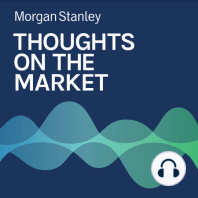3 min listen

Economic Roundtable: What’s in Store for ’24?
Economic Roundtable: What’s in Store for ’24?
ratings:
Length:
8 minutes
Released:
Dec 16, 2023
Format:
Podcast episode
Description
Join our first quarterly roundtable where Morgan Stanley’s chief economists discuss the outlook for the U.S., Europe, China, and Japan.----- Transcript -----Seth Carpenter: Welcome to Thoughts on the Market. I'm Seth Carpenter, Morgan Stanley's Global Chief Economist. On this special episode of the podcast, we're going to hold a roundtable discussion focusing on Morgan Stanley's global economic outlook for 2024. It's Friday, December 15th at 4 p.m. in London. Ellen Zentner: 11 a.m. in New York. Jens Eisenschmidt: 5 p.m. in Frankfurt. Chetan Ahya: And midnight in Hong Kong. Seth Carpenter: So today I am joined by the leaders of the economics teams in key regions for a roundtable discussion that we're going to start to share each quarter. I'm with Ellen Zentner, our Chief U.S. Economist, Chetan Ahya, our Chief Asia Economist, and Jens Eisenschmidt, our Chief Europe economist. I want to talk with you three about the outlook for the global economy in 2024. Clearly, we're going to need to hit on growth, inflation, and we'll talk about how the various central banks are likely to respond. Let's start with the U.S., Ellen, how do you see the U.S. economy faring next year? What's just like the broad contours of that forecast? Ellen Zentner: Sure. Well, you know, the soft landing call that we've had since early 2022, we're rolling forward into a third year. I think what's important is why do we expect to finally get the slowing in the economy? We think that the fiscal impulse, which has been positive and made the Fed's job harder, is finally overcome by monetary policy lags that overcome and become more of a strain on the economy. We've got a slowing consumer. That's basically because labor demand is slowing and labor income is slowing. But again I think the whole view, the outlook is that the economy is slowing but not falling off a cliff. That's going to lead deflation in core goods to continue and disinflation in services so that inflation is coming down. So the Fed, after having remained on hold for quite some time, we think will start to cut in June of next year and ultimately deliver four rate cuts through the course of the year. And then another 200 basis points as we move through 2025. Jens Eisenschmidt: Yeah, if I can jump in here with a view from Europe. So it's striking how similar and at the same time different the views are here, in the sense that the starting point for Europe is much weaker growth. Yet we also get a big disinflation on the way we see actually euro area inflation ending at the ECBs target, or reaching the ECB target at the fourth quarter of 2024. Now for growth, we do have, as I said, a weak patch we are in. It's actually a technical recession with two negative quarters, Q3 and Q4 and 23. And then we are actually accelerating from there, but not an awful lot. So because we see potential growth very low, but consumption actually is picking up. So that's essentially the opposite in some sense, the flip side, but still very weak growth overall. Seth Carpenter: Okay, Jens. So against that backdrop of your outlook for Europe, what does that mean for the ECB? And in particular, it sort of looks like if the Fed's cutting in June, does the ECB have to wait until the Fed cuts or can it go before the Fed? How are you thinking about policy in Europe? Jens Eisenschmidt: No, I think that's a great question also, because we get that a lot from clients and we get a lot this sort of based on past regularities observation that the ECB will never cut before the Fed. And technically speaking, we have actually now forecast the ECB cutting before the Fed just one week. So they cut in June as well. And I think the issue here is really hardwired in the way we see the disinflation process and the information arriving at the doorstep of the ECB. They are really monitoring wages and are really worried about the wage developments. So they really want to have clarity about Q1 in particular wages, Q1 24. This clarity will only arrive l
Released:
Dec 16, 2023
Format:
Podcast episode
Titles in the series (100)
Michael Zezas: Three Possible Trade Paths from the G20 by Thoughts on the Market